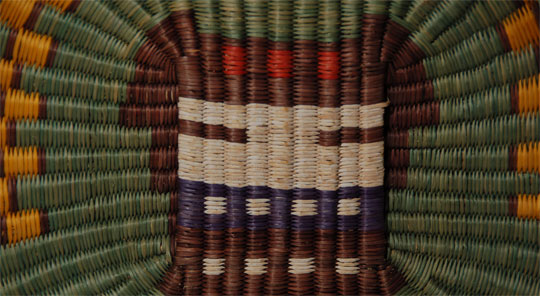Hopi Third Mesa Wicker “Angak’chinmana” Katsina Image Plaque [R]
+ Add to my watchlist Forward to Friend
Forward to Friend
- Category: Trays and Plaques
- Origin: Hopi Pueblo, Hopituh Shi-nu-mu
- Medium: native materials
- Size: 14” diameter
- Item # C3284F
- Price No Longer Available
The Angak'chinmana is the female katsina that always accompanies the male Angak'china when he appears and dances in the plaza. (See Item #C3284E for the male version). "There are usually about half or a third as many Manas as there are Kachinas, and they dance in a separate line, gesturing with the spruce bough that they hold in each hand." Wright 1973
Wicker basket weaving is an art in itself, unique to Hopi Third Mesa villages. Numerous plants are collected in their natural state and dyed with vegetal or aniline paints. Collecting materials is also an art in that the women must know when to pick because the bushes mature at different times and the stems used in weaving must be pliable and straight and this depends on the maturity cycle. The flowers from plants are used for dying the stems. This process of collecting materials and dying them must be mastered before a weaver can proceed to be a basket maker.
Condition: original condition
Provenance: from the collection of an Arizona resident
Recommended Reading; Hopi Basket Weaving: Artistry in Natural Fibers by Helga Teiwes

- Category: Trays and Plaques
- Origin: Hopi Pueblo, Hopituh Shi-nu-mu
- Medium: native materials
- Size: 14” diameter
- Item # C3284F
- Price No Longer Available



